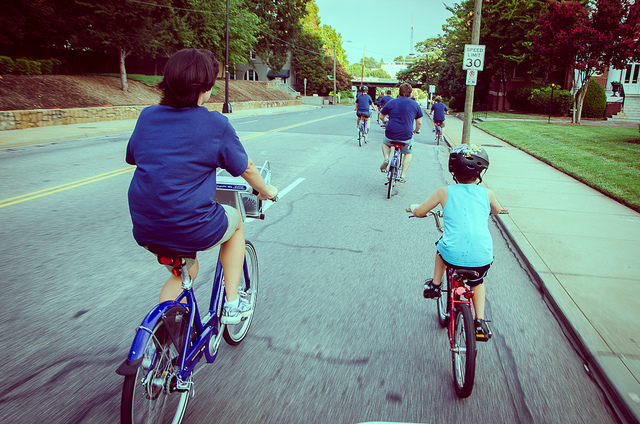
Charlotte, N.C., riding forward into a bike-friendly future
Photo by Flickr user Tyler LaCross.
What does Charlotte need to become a more bike-friendly city?
- Events to let people experience the joy of cycling;
- A clearinghouse for easy, safe routes;
- Better signage identifying bike routes;
- More bike safety information included in driver’s license testing;
- A central cycling hub where bike commuters can grab a shower and store their bikes during work hours;
- Wider and protected bike lanes;
- Wider greenway trails.
These ideas are just a sample of the many generated by about 60 cycling enthusiasts from Charlotte who came together this week to share their ideas. RELATED LINKS
“Want to build a bikeable city? Focus on those who don’t bike” by Andrew Sherry on Knight Blog, 10/10/14
“Creating a more connected Charlotte, N.C.” by Susan Patterson on Knight Blog, 09/09/14
The community conversation, sponsored by Knight Foundation and facilitated by The Lee Institute, was a first step to building a coalition of activists leading change.
Knight Foundation’s strategy in Charlotte is to create connections that link people across generational and geographical boundaries to accelerate talent, opportunity and engagement. We’re exploring how public spaces can increase connections and engagement, and how we use our streets – our largest publicly owned space – for something besides cars.
If the energy in the room at the cycling conversation is an indicator, it was a success.
Participants included the city’s bicycle program manager, the county’s parks director, bicycle shop owners, early morning exercise riders, weekly leisure riders and bike commuters. Dianna Ward, executive director of the B-Cycle bike sharing program, even organized a bike valet service for the folks who pedaled to the meeting. About half did – even though it was rainy afternoon.
Perspectives reflected those differences.
Shawn Mosely is involved with 36th Street Racing, a cycling group that hosts and participates in regular group rides, charity events and races in the area.
He says he sees more folks cycling, and he believes that’s good. But, he said, “I’m eager for the day when my wife rides to the grocery store.”
Another, who described himself as an everyday cyclist who commutes to work on his bike, said he hopes “fast cycling” groups can become ambassadors for safe cycling.
There was agreement at the end of the discussion that Charlotte has infrastructure to build on. In 2003, Charlotte had only one bike lane. Today, it has 174 bike lanes, signed bike routes and off-road cycling paths.
It also has a group of passionate cycling activists.
At the end of the meeting, their nodding heads indicated interest in staying together as a loose coalition to set a goal and identify the actions needed to reach that goal.
Missing from this conversation were non-riders, those who cycle as their primary transportation because they must, exercise-only riders and aspiring riders, law enforcement and the schools. Their voices are needed, the group agreed, to ensure a diverse group of perspectives are included in the problem-solving discussion to follow.
The meeting, likely in January, will invite people from all of those groups. Stay tuned. This group is ready to get rolling, and Charlotte will be better for it.
Susan Patterson is Charlotte program director at Knight Foundation.
Recent Content
-
Communitiesarticle ·
-
Communitiesarticle ·
-
Communitiesarticle ·


